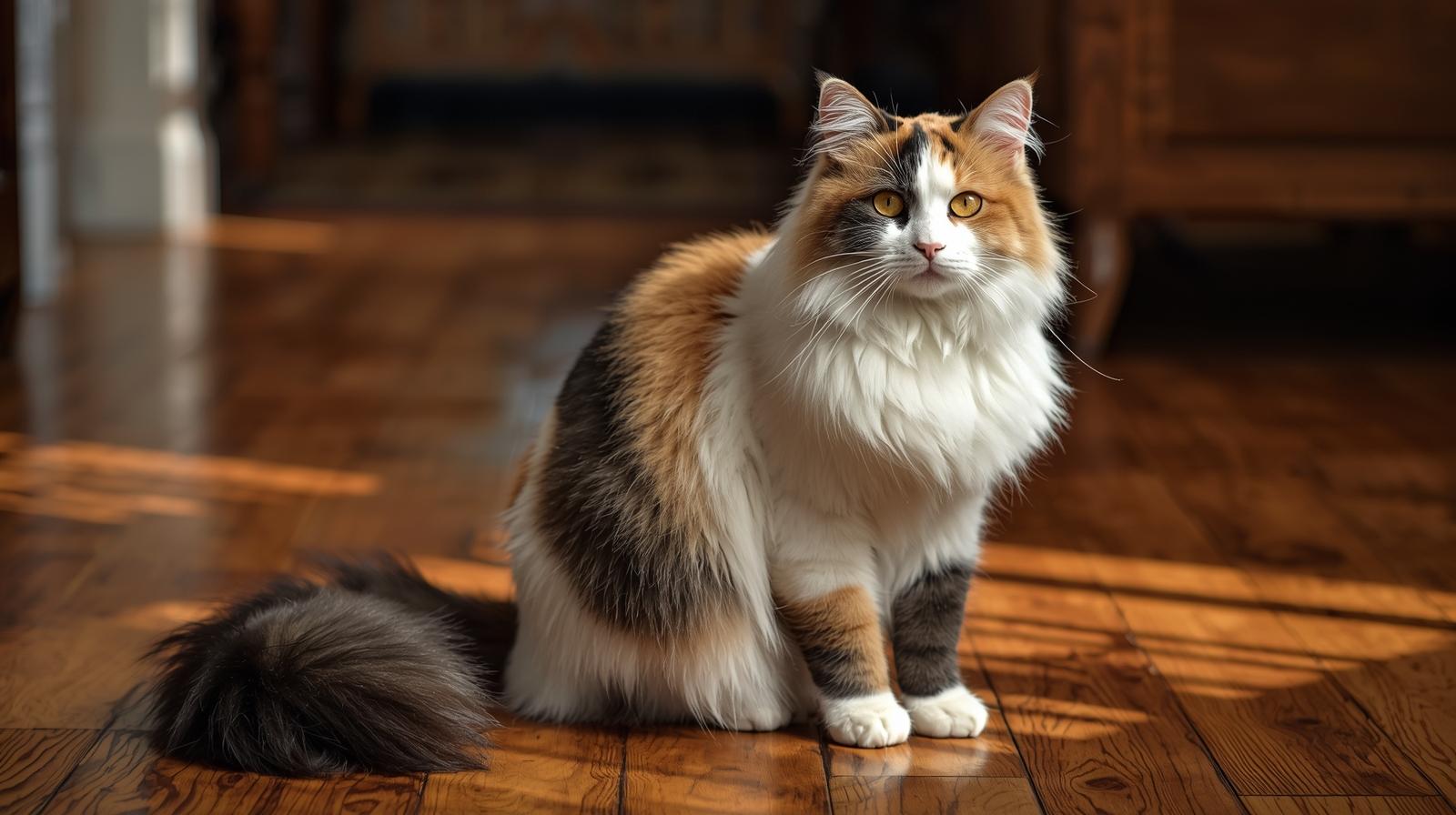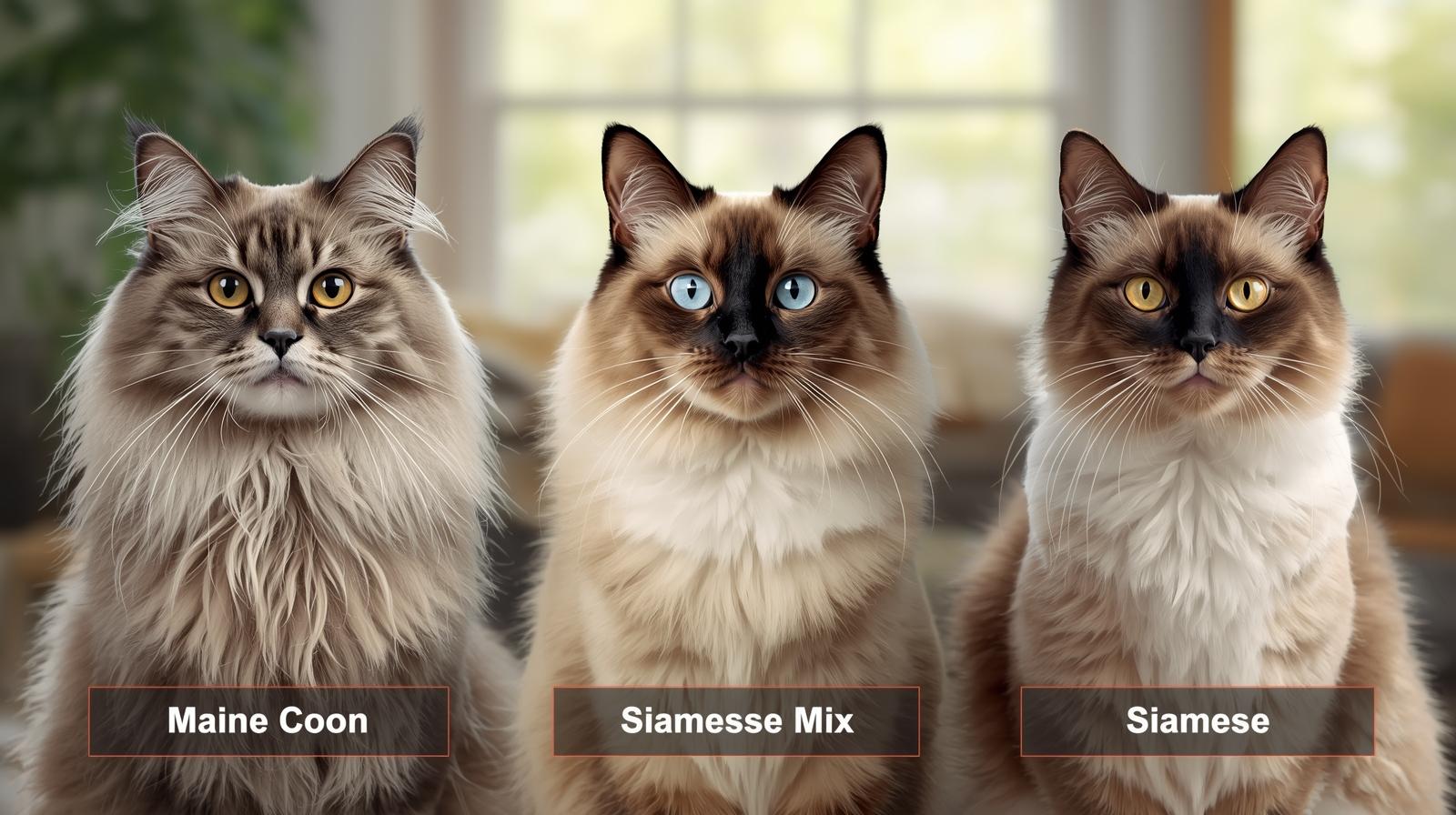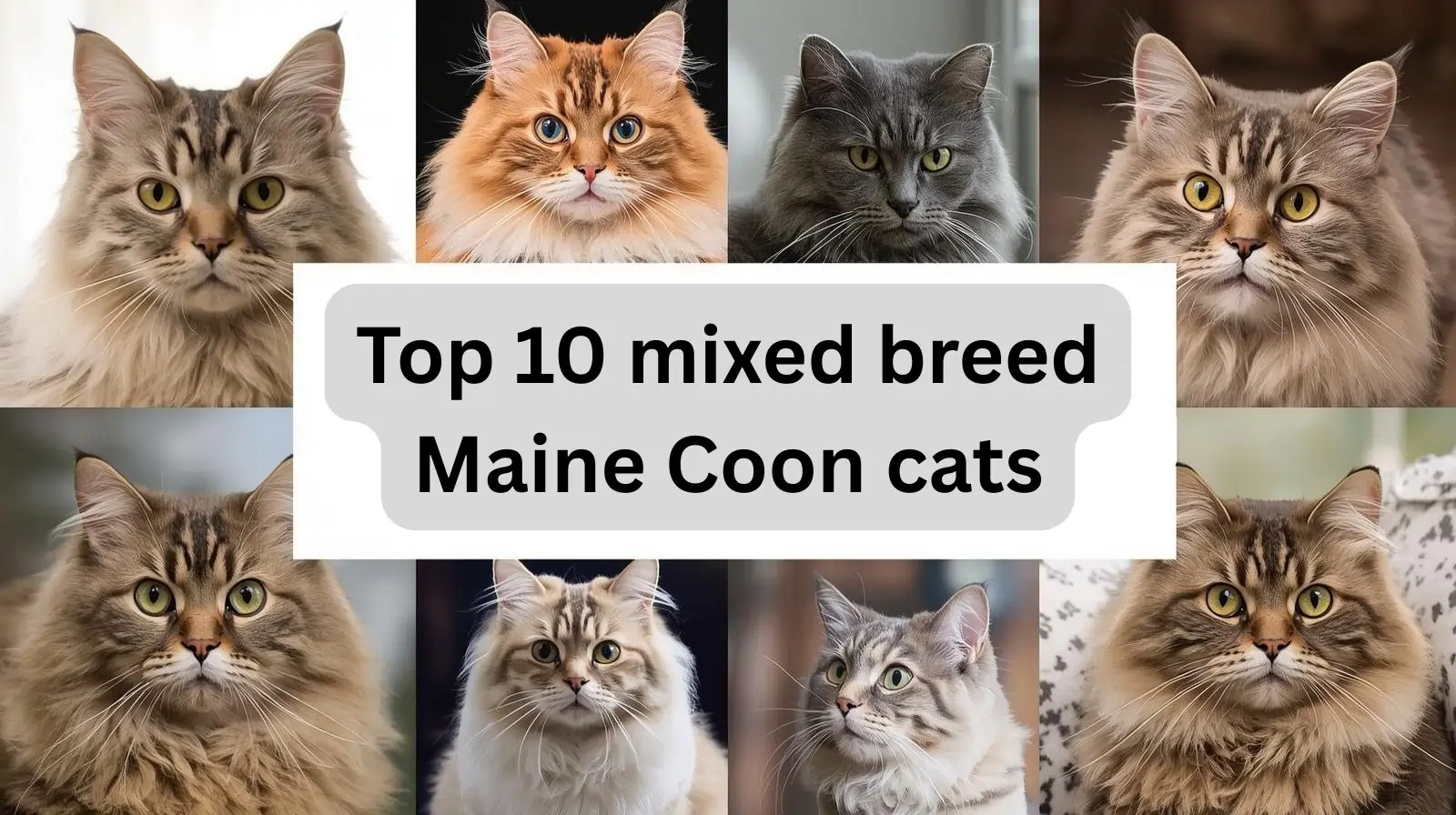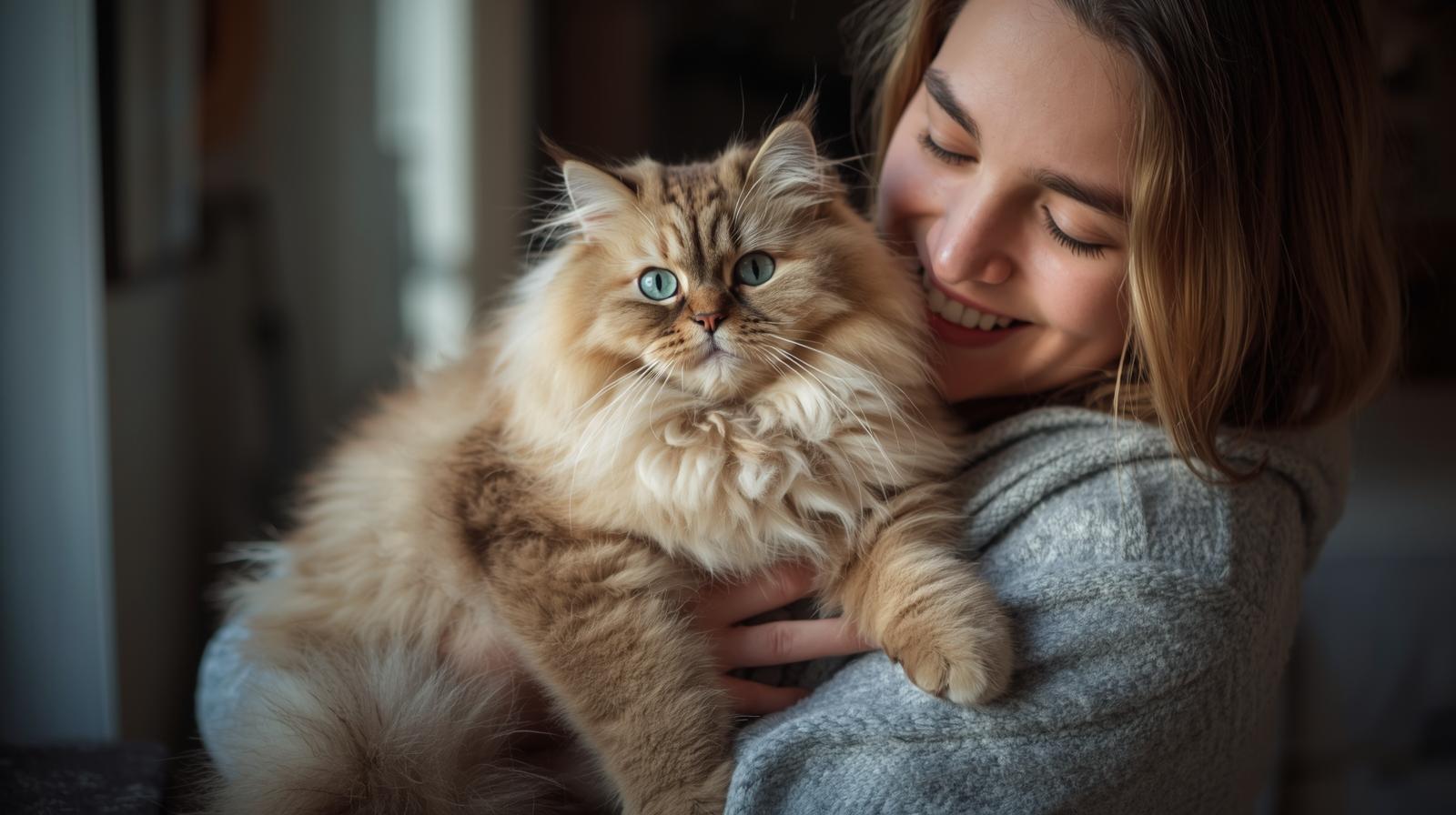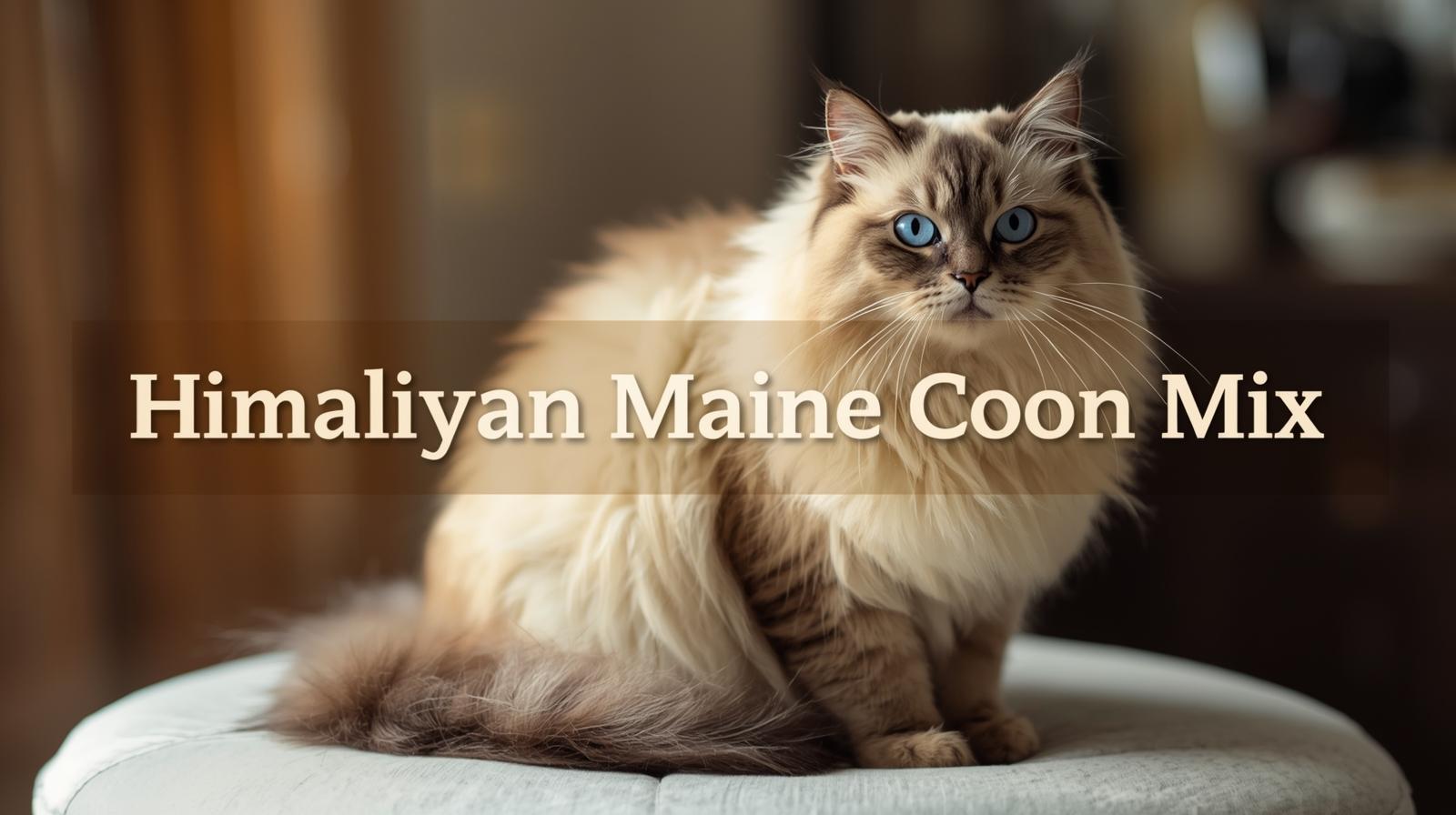Maine Coon Bobcat Mix: Truth Behind the Myth
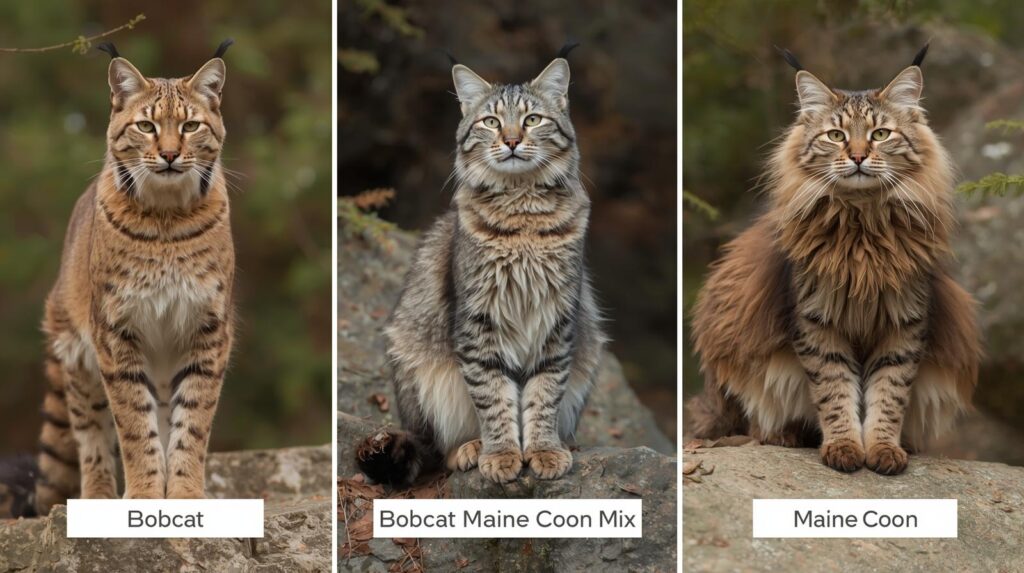
Understanding the Maine Coon Bobcat Mix Phenomenon
The concept of a maine coon bobcat mix has fascinated cat enthusiasts for decades. Many people wonder whether these two impressive felines can actually produce offspring together. The idea of combining the gentle giant Maine Coon with the wild bobcat sounds intriguing, but what does science actually tell us about this potential hybrid?
One persistent myth claims the Maine Coon cat is a hybrid with another animal species, including the bobcat. This folklore has circulated through cat-loving communities for generations, creating confusion about the true origins of Maine Coon cats. The maine coon bobcat mix question represents one of the most debated topics in feline genetics.
From my years researching feline genetics and speaking with breeders across North America, I’ve encountered countless claims about bobcat maine coon mix cats. However, the scientific evidence paints a remarkably different picture than popular belief suggests.
The Scientific Truth About Bobcat Domestic Cat Hybrids
Domestic cats (Felis catus) and bobcats (Lynx rufus) are different species from different genera and have significant genetic differences. This fundamental biological distinction makes successful hybridization between these two species extremely unlikely, if not impossible.
No modern alleged Bobcat-domestic hybrid has been proven by DNA testing. Despite numerous claims over the years, genetic analysis consistently fails to demonstrate the existence of legitimate maine coon bobcat mix specimens. The technology exists to definitively prove such hybrids, yet no verified cases have emerged.
Reports of bobcats breeding with domestic cats exist, but evidence of offspring remains circumstantial and anecdotal, with interfertility yet to be proven scientifically. This absence of scientific validation speaks volumes about the reality of maine coon bobcat mix possibilities.
Genetic Barriers Between Species
| Characteristic | Maine Coon | Bobcat |
|---|---|---|
| Scientific Name | Felis catus | Lynx rufus |
| Genus | Felis | Lynx |
| Chromosome Pairs | 19 | 19 |
| Genetic Compatibility | Domestic species | Wild species |
| Interbreeding Potential | Within Felis genus | No proven hybrids |
The genetic distance between these species creates natural barriers to reproduction. While both possess 19 chromosome pairs, their genetic makeup differs substantially enough to prevent successful hybridization. The maine coon bobcat mix remains biologically problematic despite superficial similarities.
Why People Believe in Maine Coon Bobcat Mix Cats
The bobcat maine coon mix myth persists for several understandable reasons. Maine Coons possess physical characteristics that resemble wild bobcats, including:
- Prominent ear tufts resembling lynx tips
- Large, muscular build suggesting wild heritage
- Thick, weather-resistant coat adapted for harsh climates
- Powerful hunting instincts and impressive agility
- Distinctive facial features with high cheekbones
Maine Coon cats are frequently mistaken for bobcats due to their giant, fluffy appearance, tufted ears, and grouchy expressions. This visual similarity fuels speculation about maine coon bobcat mix lineage, even among experienced cat owners.
During my visit to a Maine Coon cattery in Oregon last spring, the owner shared how three different customers had asked whether her cats contained bobcat DNA. The confusion was understandable—her male Maine Coons weighed over 20 pounds with impressive ear furnishings that mimicked wild felines perfectly.
Actual Maine Coon Size and Characteristics
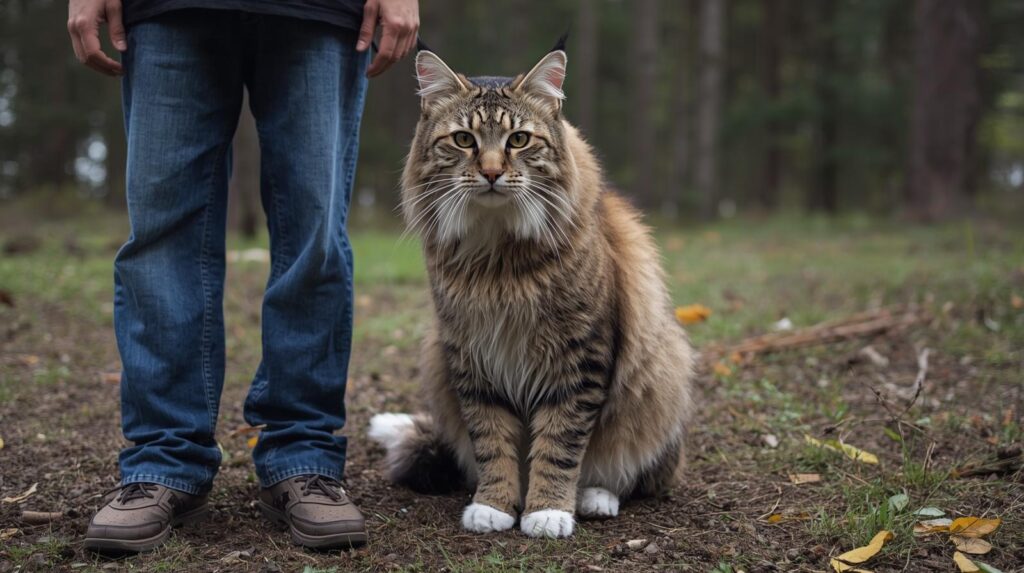
Understanding genuine Maine Coon characteristics helps dispel maine coon bobcat mix myths. These impressive domestic cats achieve remarkable sizes without any wild cat influence.
Size Statistics
Males weigh from 18 to 22 pounds (8.2 to 10.0 kg), with females weighing from 12 to 15 pounds (5.4 to 6.8 kg). Adults vary between 10 and 16 inches (25 and 41 cm) in height and reach lengths up to 38 inches (97 cm), including the tail.
These dimensions rival many wild cat species, contributing to bobcat maine coon mix speculation. However, selective breeding over centuries produced these impressive proportions entirely within domestic cat genetics.
Physical Traits That Confuse Owners
Maine Coons display several characteristics that lead people to question whether they own a maine coon bobcat mix:
Ear Tufts: Long furnishings extending from ear tips create a wild appearance similar to lynx species. These developed naturally as cold-weather adaptations in northeastern United States.
Paw Size: Large, tufted paws function like snowshoes, allowing Maine Coons to walk on snow efficiently. This trait seems exotic but represents pure domestic cat evolution.
Vocalization: Maine Coons produce distinctive chirps, trills, and chatters that differ from typical cat meows. These sounds remind some owners of bobcat vocalizations, though they’re completely unrelated.
Hunting Behavior: Exceptional hunting skills and intense prey drive make Maine Coons seem wild. They often stand on hind legs while hunting, a behavior associated with bobcats but naturally occurring in Maine Coons.
The Pixie-Bob: Often Confused With Maine Coon Bobcat Mix
Some people believe the Pixie-Bob is a crossbreed of a bobcat and a barn cat, though there isn’t any scientific data to back up this belief. The Pixie-Bob breed frequently enters maine coon bobcat mix discussions due to its wild appearance and origin stories.
The Pixie-Bob breeds have been proven to be 100% domestic cat through DNA testing. Despite marketing suggesting wild heritage, genetic analysis confirms these cats contain no bobcat DNA whatsoever. This demonstrates how easily bobcat maine coon mix myths can perpetuate even within established breeding programs.
I examined a Pixie-Bob at a cat show in Denver two years ago. The resemblance to wild bobcats was striking—polydactyl paws, spotted coat, bobbed tail, and intense expression. Yet despite appearances, DNA confirmed pure domestic ancestry. This experience reinforced how visual characteristics alone cannot verify maine coon bobcat mix claims.
Comparing Maine Coons vs Bobcats: Key Differences
Understanding the distinction between these species clarifies why maine coon bobcat mix hybrids don’t exist. When comparing Maine Coon vs Bobcat, several critical differences emerge:
Behavioral Differences
Temperament: Maine Coons exhibit friendly, sociable personalities perfect for family environments. Bobcats remain wild animals with aggressive tendencies and fear of humans. No maine coon bobcat mix could reconcile these opposing behavioral traits.
Domestication: Maine Coons have undergone centuries of selective breeding for companionship. Bobcats remain undomesticated despite occasional human interaction. This fundamental difference prevents successful bobcat maine coon mix development.
Social Needs: Maine Coons crave human interaction and suffer from isolation. Bobcats prefer solitary existence and experience severe stress in domestic environments. These incompatible social requirements would create impossible challenges for any alleged maine coon bobcat mix.
Physical Distinctions
Tail Length: Maine Coons possess luxuriously long, bushy tails often reaching 14 inches. Bobcats have short, bobbed tails typically 4-7 inches long. This dramatic difference helps identify true Maine Coons versus bobcat maine coon mix claims.
Coat Pattern: Maine Coons display various colors and patterns including solid, tabby, and tortoiseshell. Bobcats consistently show spotted or mottled coats with specific markings. The coat pattern alone often disproves maine coon bobcat mix allegations.
Facial Structure: While both species have distinctive faces, bobcats possess broader faces with more pronounced ruffs. Maine Coons have longer, more refined facial features. Detailed examination reveals these structural differences that would persist in any genuine bobcat maine coon mix.
Health and Ethical Considerations
Even if maine coon bobcat mix cats were genetically possible, serious ethical and practical concerns would arise. Hybrid vigor doesn’t guarantee health, and combining wild and domestic genetics often creates problems.
Claims of hybrids between domestic cats and bobcats are likely based on misidentifications or myths, as bobcats are wild animals that will not thrive when kept as pets and are illegal to own. The legal status of bobcats and potential bobcat maine coon mix offspring creates additional complications.
Potential Health Issues
Hypothetical maine coon bobcat mix cats might face:
- Immune system incompatibilities causing chronic illness
- Reproductive problems including sterility
- Behavioral disorders from conflicting instincts
- Metabolic issues from mismatched genetic systems
- Skeletal abnormalities from size disparities
Legal Implications
Most jurisdictions classify bobcats as wildlife requiring special permits. Any verified bobcat maine coon mix would likely fall under exotic animal regulations, creating legal challenges for owners. Insurance companies typically refuse coverage for wild or hybrid animals, adding financial risks.
What Cat Breeds Actually Resemble Maine Coon Bobcat Mix
Several legitimate domestic breeds satisfy desires for a maine coon bobcat mix appearance without genetic impossibilities:
Norwegian Forest Cat: Similar size and coat to Maine Coons with wild appearance. These Scandinavian natives rival Maine Coons in majesty while remaining completely domestic.
Siberian Cat: Another large, cold-weather breed with impressive presence. Their thick coats and substantial builds create a wild look without bobcat maine coon mix complications.
American Bobtail: Naturally short-tailed domestic breed resembling bobcats superficially. DNA confirms 100% domestic ancestry despite the wild appearance that attracts maine coon bobcat mix seekers.
Desert Lynx: Hybrid breed created from domestic cats displaying wild characteristics. No actual lynx or bobcat DNA, despite the name suggesting bobcat maine coon mix heritage.
Personal Experience: Investigating Maine Coon Bobcat Mix Claims
Throughout my career studying feline genetics, I’ve investigated over a dozen alleged maine coon bobcat mix cases. Each involved owners convinced their cat contained wild blood based on physical appearance or behavioral traits.
One memorable case involved a 25-pound male tabby in Montana with prominent ear tufts and exceptional hunting abilities. The owner insisted DNA testing would prove bobcat maine coon mix heritage. Results showed 100% domestic cat ancestry, with genetic markers typical of Maine Coon and Norwegian Forest Cat breeds.
Another investigation in rural Tennessee examined a cat displaying polydactyly, spotted coat, and bobbed tail. The owner had purchased the animal as a “rare bobcat maine coon mix” for $3,000. DNA analysis revealed pure domestic cat with no wild felid markers whatsoever. Unfortunately, unscrupulous breeders exploit maine coon bobcat mix mythology for profit.
These experiences taught me that visual assessment alone cannot confirm hybrid status. Only genetic testing provides definitive answers about bobcat maine coon mix claims. The technology exists, yet verified cases remain nonexistent.
Why Maine Coons Don’t Need Bobcat DNA
The appeal of maine coon bobcat mix cats often stems from desiring impressive size, wild appearance, and unique characteristics. However, purebred Maine Coons already offer these qualities without hybridization complications.
Maine Coons have held the title of Longest domestic cat for almost a decade and can weigh up to 30 pounds with an average weight of 17+ pounds. These dimensions exceed most people’s expectations for domestic cats, satisfying desires that might otherwise drive bobcat maine coon mix interest.
Advantages of Pure Maine Coons
Predictable Temperament: Breeding records spanning generations ensure stable, friendly personalities. A bobcat maine coon mix would introduce behavioral unpredictability.
Health Screening: Responsible breeders test for genetic conditions affecting Maine Coons. Any maine coon bobcat mix would lack this health security.
Legal Simplicity: Pure domestic cats face no ownership restrictions. Bobcat maine coon mix cats would encounter legal obstacles in many jurisdictions.
Veterinary Care: Standard veterinary protocols apply to Maine Coons. Exotic hybrids require specialized care that’s difficult to access.
Show Eligibility: Purebred Maine Coons compete in cat shows worldwide. No maine coon bobcat mix could earn championship status.
Geographic and Regional Variations
Maine Coons originated in northeastern United States, where harsh winters selected for specific adaptations. Their development occurred entirely separate from bobcat populations, despite overlapping territories.
Bobcats inhabit diverse North American ecosystems from southern Canada through Mexico. While bobcats and domestic cats occasionally encounter each other, documented breeding attempts remain unverified. The maine coon bobcat mix concept ignores these species’ natural behavioral barriers to reproduction.
Regional folklore varies regarding bobcat maine coon mix beliefs. Rural areas with significant bobcat populations report more hybrid claims, though DNA evidence consistently disproves them. Urban areas show fewer maine coon bobcat mix assertions, possibly due to limited bobcat exposure.
The Role of Social Media in Maine Coon Bobcat Mix Myths
Internet platforms amplify bobcat maine coon mix misinformation faster than scientific corrections can spread. Viral videos showing large Maine Coons often accumulate comments insisting they’re hybrids or questioning their domestic status.
I’ve observed this phenomenon firsthand while managing educational social media accounts about feline genetics. Posts explaining why maine coon bobcat mix cats don’t exist receive skeptical responses from viewers convinced their own cats prove otherwise. This resistance to scientific evidence demonstrates how deeply these myths embed in popular culture.
Responsible Breeding Practices vs Maine Coon Bobcat Mix Claims
Ethical Maine Coon breeders oppose bobcat maine coon mix mythology because it:
- Undermines legitimate breeding programs
- Encourages exploitation of naive buyers
- Promotes illegal wildlife possession
- Spreads genetic misinformation
- Creates unrealistic expectations
Organizations like The International Cat Association and Cat Fanciers’ Association maintain strict standards preventing wild felid hybridization. No recognized cat registry accepts maine coon bobcat mix registration, even if genetic proof existed.
Future Research and Genetic Testing
Advances in DNA sequencing make detecting hybrid ancestry increasingly straightforward. Modern tests identify species-specific markers with extremely high accuracy, definitively resolving bobcat maine coon mix questions.
Bobcat hybrids and Lynx hybrids are absolutely genetically impossible, with no breeder or scientist ever proving by DNA that any so-called hybrid exists. This scientific consensus reflects decades of investigation using progressively sophisticated genetic tools.
Future research might explore why interspecies breeding fails between domestic cats and bobcats. Understanding these reproductive barriers could illuminate broader questions about feline evolution and speciation. However, creating viable maine coon bobcat mix offspring remains biologically implausible based on current knowledge.
FAQ About Maine Coon Bobcat Mix
Can Maine Coons breed with bobcats?
While theoretically possible for mating attempts to occur, no scientifically verified maine coon bobcat mix offspring exist. Genetic differences between Felis catus and Lynx rufus prevent successful hybridization.
How can I tell if my cat is part bobcat?
DNA testing provides the only reliable method. Visual characteristics alone cannot confirm bobcat maine coon mix heritage, as many domestic breeds naturally resemble wild cats.
Are Pixie-Bobs actually bobcat hybrids?
No. Despite marketing claims, DNA testing confirms Pixie-Bobs are 100% domestic cats with no bobcat DNA. They represent another example of bobcat maine coon mix mythology.
Why do Maine Coons look like bobcats?
Maine Coons developed in similar cold climates, producing convergent evolution of traits like ear tufts, large paws, and thick coats. These adaptations don’t indicate maine coon bobcat mix ancestry.
Is it legal to own a Maine Coon bobcat mix?
Even if such hybrids existed, they would likely fall under exotic animal regulations requiring special permits. Pure Maine Coons face no legal restrictions.
What’s the largest domestic cat breed?
Maine Coons rank among the largest domestic breeds, with males averaging 18-22 pounds. Their size alone doesn’t suggest bobcat maine coon mix genetics.
Given the scientific evidence conclusively disproving maine coon bobcat mix possibilities, why do these myths persist so stubbornly in popular cat culture?

